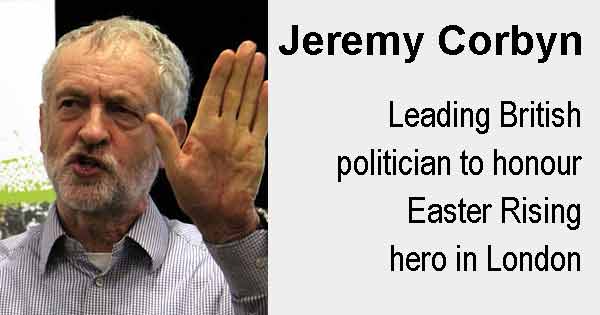The UK’s Leader of the Opposition Jeremy Corbyn has defended his pro-Irish Republican stance during the Troubles and revealed he plans to erect a plaque to one of Ireland’s heroes.
Mr Corbyn won a landslide victory to become leader of the British Labour Party earlier this month.
This week he announced plans to erect a plaque to Irish Republican Constance Markievicz in London.

Markievicz played a key role in the 1916 Easter Rising and was also the first ever woman to be elected to the British House of Commons.
She was in prison at the time so wasn’t able to take her seat. However, as a member of Sinn Féin she wouldn’t have taken a seat in the British parliament anyway.
Mr Corbyn said that a plaque to honour Markievicz would be erected at the refurbished library in his constituency in Islington, London.
He said: “Our important footnote in history is that the first woman elected to Parliament came from Islington North.
“She was in Her Majesty’s Prison Holloway at the time.
“It was, of course, Connie Markievicz who was elected as a Sinn Féin member for Dublin Central, the first woman elected to Parliament.
“She didn’t want to take her seat and couldn’t take her seat anyway.
“But I have been discussing this with women colleagues on Islington Council and when we rebuild our library next to the prison we are going to have a plaque, a memorial, up so that all the generations can understand the contribution that Connie Markiewicz and so many others made.”
Meanwhile, Mr Corbyn has come in for scrutiny in some quarters of the British media because of his support for Irish Nationalists during the Troubles.
During the 1980s he invited members of the IRA including Gerry Adams to the British Houses of Parliament.
Mr Corbyn said he reached out to the Republicans because he “wanted the violence to stop”.
He said: “I don’t want violence, I don’t want killing, I don’t want all the horrors that go with it.”
He told the BBC that the people he had met during the Troubles had been former prisoners who had served their sentences and his intention had been to work with them to find a peaceful way forward.
He told the Andrew Marr Show: “Yes, I did make myself very unpopular with some people by a preparedness to reach out to the republican tradition in Ireland, to say ultimately this war is unwinnable by either side, there is never going to be a military (answer) – therefore there has to be a political dialogue.
“At the same time, secretly, the British government was also engaged in that and then eventually in 1994 we got the first ceasefire.”
He denied that he was less critical of the violence committed by the IRA to that of the British Army. He said: “The violence was wrong on all sides and I have said so all along.
“My whole point was if we are to bring about a peace process, you weren’t going to achieve it by military means.”